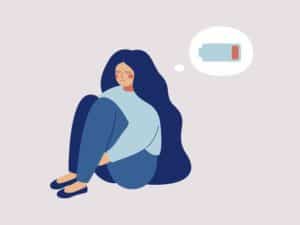Adults frequently complain of feeling heavy, feeble, and weary. When unsure of what triggers these emotions, they are considerably more upsetting—much grapple with the mystery of why they feel heavy, frail, and exhausted. Don’t lose hope if you’re one of them. Now we will try to explain what causes you to feel this way. So, why does your body feels heavy? Let’s learn!
7 Reasons Why Your Body Feels Heavy
1. Lack of sleep
The leading cause of fatigue is getting too little or insufficient sleep. Stress, certain medical disorders, and unsuitable sleeping surroundings can all hurt rest and lead to insomnia.
According to the American Academy of Sleep Medicine, healthy individuals require seven to nine hours of sleep per night.
Work on altering your sleep schedule if you get less than seven hours each night. Treatments for insomnia may include taking natural supplements, taking pharmaceuticals, and managing underlying medical conditions. Consult a professional to receive medical advice.
2. Deficits in Nutrients
Do you ask yourself, ‘why does my body feels heavy’ although you have a good diet? Even if you think you follow a healthy diet plan, nutritional inadequacies you may not notice might make you feel weak.
Fatigue has been associated with vitamin deficiencies in the following areas.
- Iron
- Riboflavin (vitamin B2)
- Niacin (vitamin B3)
- Pantothenic acid (vitamin B5)
- Pyridoxine (vitamin B6)
- Folate (vitamin B9)
- Vitamin B12
- Vitamin D
- Vitamin C
- Magnesium
Many of these nutrients are frequently deficient in the body.
Around 25% of the world’s population suffers from anemia. The most typical type of anemia, which accounts for 50% of all anemia, is iron deficiency anemia. One of the most prevalent signs of this illness is fatigue, but it usually gets better once iron stores are replenished. Because the body’s capacity to absorb B12 decreases with age, this insufficiency is more prevalent in elderly persons.
Low amounts of B12 can result in acute weariness because it is essential for producing energy and delivering oxygen.
Additionally, weariness may result from a vitamin D shortage. The vitamin D levels of more than 50% of the world’s population are insufficient.
If you’re feeling drained daily for no apparent reason, it’s crucial to check your vitamin levels because these shortages are frequent.
Usually, as your vitamin levels return to normal, the exhaustion caused by a dietary shortage in one or more nutrients improves.
3. Stress
A certain amount of stress is average, but persistent stress is associated with your body feeling heavy and tired.
In reality, persistent stress can cause stress-related exhaustion disorder (ED), a syndrome that manifests as mental and physical tiredness.
Chronic stress can also result in structural and functional changes in the brain and chronic inflammation, which can affect how you feel and contribute to symptoms like weariness.
Even though you might not be able to avoid stressful situations, particularly those involving work or family duties, learning to manage your stress may help you avoid becoming completely exhausted.
For instance, you can schedule a time to unwind by taking a bath, practising meditation, or going for a stroll.
You might get assistance from a therapist in creating stress-reduction plans.
Too much stress hormone can wear you out and lower your quality of life. Making time for ourselves a priority can aid stress management.
4. Poor Diet
What you consume has a direct impact on your energy levels. Eating too much-processed food and sugar might make your body feels heavy and exhausted.
Choose a balanced diet with lots of fresh produce and unsaturated fats. Your diet significantly effects why your body feels heavy. A balanced diet rich in nutrient-dense meals is crucial to sustain energy levels and receive the nutrients your body needs to perform essential functions.
Undereating or consuming highly processed foods and deficient in essential nutrients can result in calorie and nutritional shortages, which can wear you out.
Your body starts destroying fat and muscle to meet energy needs when you don’t consume enough calories and nutrients, such as protein. Due to the loss of body fat and muscle mass, tiredness may result.
High-refined grains and added sugars are linked to a higher risk of insomnia. In contrast, diets with fruits, vegetables, and whole grains are connected to a lower risk.
In addition to giving your body the nutrition, it needs, eating a diet low in ultra-processed foods and added sugar and high in nutrient-dense foods like fruits, vegetables, legumes, and protein sources like fish and eggs may help you feel less tired and support good sleep.
Your energy levels may be hampered by a diet high in ultra-processed foods, so switching to a nutrient-dense diet rich in whole, nourishing foods like fruits, vegetables, and legumes may help you feel less tired.
5. Insulin Resistance
The hormone insulin is secreted by the body to transform sugar (in the form of glucose) into energy. It facilitates glucose uptake by your cells, enabling them to convert it to energy or store it for later use.
Glucose does not enter cells and properly convert to energy if the cells grow resistant to insulin. You experience a lack of energy that makes you hungry and increase your appetite. This is also why your body feels heavy, lazy, and feeble.
Although everyone can develop insulin resistance, sedentary lifestyles and having more belly fat increase this risk.
6. Anxiety and depression
Common signs of sadness and anxiety include weariness, weakness, and body heaviness. Because the neurotransmitters that control energy malfunction, people with depression frequently experience persistent weakness and weight.
The heaviness and exhaustion that come with worry are typically sided consequences of nervous system arousal. When you detect a threat, your body generates hormones to support your defence, and when those chemicals wear out, you “crash.” Your body has a more challenging time adjusting the more often it occurs.
If you experience anxiety or depression frequently, speak with a feel tired professional about your treatment options. Also, in this case, you can increase mindfulness and exercise to clear your mind.
7. Food intolerances
Feelings of body heaviness might occasionally be caused by stomach issues rather than a lack of energy. Many adults and kids have allergies or food intolerances that make eating uncomfortable during or after.
Inflammation in the digestive tract is usually brought on by allergies and intolerances, which causes bloating and a general sense of body heaviness.
Above all, never give up hope. There is always an explanation for why your body feels heavy.
4 Tips to Fight Tiredness
1. Exercise to Clear Your Mind
When you’re worried, confused, angry, hungover, exhausted, anxious, or sad, grab a yoga mat now! Think about who you are with your yoga practice and why you are here. Your body can recover, your immune system can work better, and your digestive system can absorb food. Don’t let your body feel heavy.
2. Take Care of Your Diet
Since healing starts from the inside out, what you eat is essential for you to feel energized. You can start optimize your nutrition plan, along with eliminating toxins from your body at TheLifeCo centers. You can also find many recipes at wannawell suitable for what your body wants from you.
For lunch and dinner, choose recipes high in protein and vegetables. Cut processed foods out of your life.
3. Try Taking Nutrients That Promote Gut Health
You may need more than just healthy and nutritious meals to solve the problem because poor digestion can make your body feel heavy. Supplements can play an essential role in balancing your overall body health. Review TheLifeCo’s supplements; you can make your body happy according to your needs.
4. Create a Meditation Routine
Share with your body how grateful you are to your body. You can protect your mental health by making time for meditation practice every day. An exercise like meditation lowers cortisol levels and inflammation, which is at the root of many diseases, such as cancer, diabetes, and heart disease. It prevents your body from feeling heavy, and your day will pass more vigorously.
If you’re looking to build new habits and enhance your health, then it’s time to start thinking about what you should be doing differently in your life. The good news is that there are many ways to make changes to your lifestyle that can improve your health and lead to better overall wellness. If you want to learn how to live a healthier lifestyle, download wannawell app for free.




Recent Comments